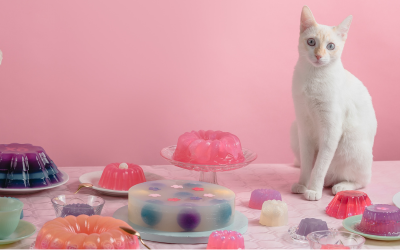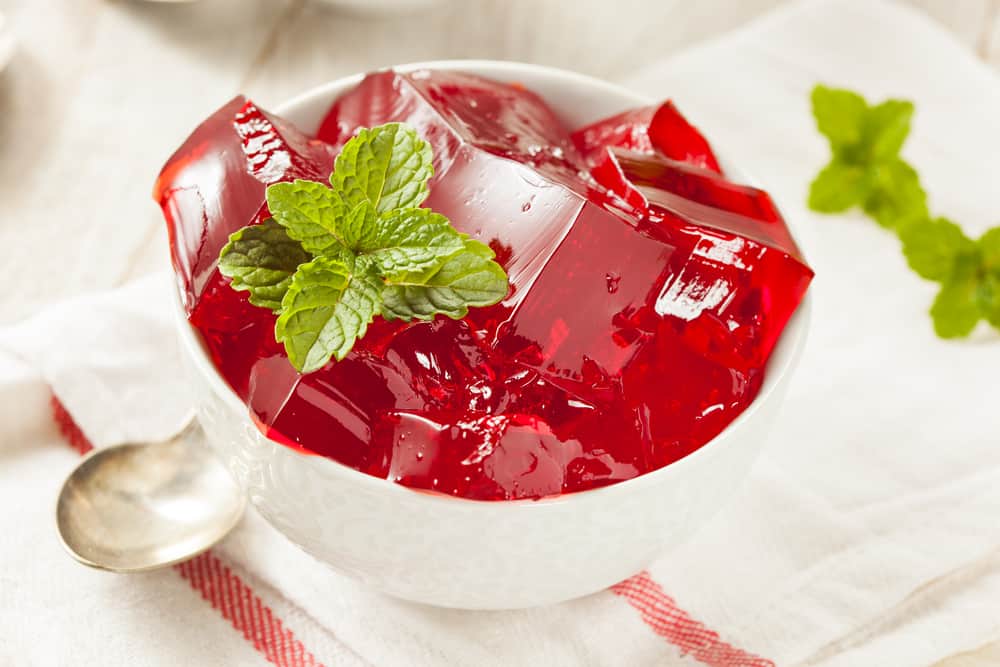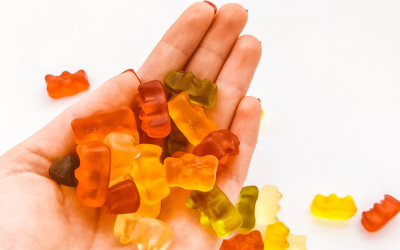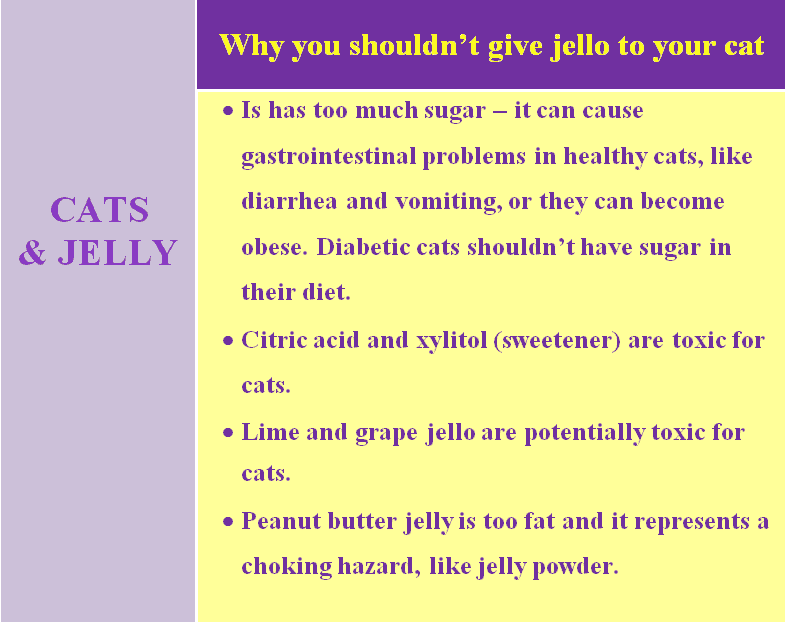
Jelly, as it is called in Great Britain, or jello (Canada and the USA) is the common name for a popular dessert based on flavored and colored gelatin. It is composed of sugar or sweeteners (xylitol) and gelatin, which is extracted by boiling bones, connective tissue, and other animal by-products.
Jello is not among cats’ favorite treats when it comes to eating things that are not for them, but there are still cats that love it.
Cats should not be fed all types of jelly treats that contain citric acid, xylitol (sweetener) and excessive sugar, as these components can lead to digestive problems and obesity.
While kittens can eat wet food with a jelly-like sauce, vegan gelatin (agar-agar) is not recommended for underweight cats or those prone to intestinal obstruction.
Can cats have gelatin?
Gelatin is a complete protein and is excellent for cats, especially for those who are fed a raw diet but lack bones. In addition to protein, gelatin also contains many amino acids (18 known so far), as well as collagen. Collagen will be absent from your cat’s diet if it does not receive bones.
In the wild, cats take their collagen by licking larger bones (the rough spikes on the cat’s tongue help remove the softer parts of the bones) or swallow small animals altogether, digesting their bones.
It is known that gelatin helps when we have problems with our bones and joints, and the same thing happens with pets; veterinarians often prescribe gelatin to the pet if it has joint problems. (1)
As a dosage, you can put a teaspoon of gelatin powder in a can of wet cat food.
Do cats actually like jello?
Jelly may not be a food that cats like, as it doesn’t meet their natural diet and preferences. It all depends on your cat’s individual taste.
Is cherry jello safe for My Feline?
It is not recommended to give your cat jelly containing xylitol and citric acid; these two ingredients are harmful to your cat’s health.

Can my cat eat strawberry or raspberry jello?
As with cherry jello, as long as strawberry or raspberry jelly does not contain too much sugar or xylitol, it is no problem if you give it to your cat from time to time as a treat.
Can my cat have lime jello?
Citrus fruits (lemons, limes, oranges, grapefruits, etc.) are toxic to cats. A small amount of lemon can cause your beloved cat gastrointestinal problems. Any part of the fruit is toxic, from seeds to skin. Linalool and limonene, along with psoralens, which are found in lemons, are among the toxic compounds for cats. Psoralens are phototoxic chemical agents for cats (in human medicine they are used to relieve psoriasis), causing skin damage (burns) after exposure to sunlight.
When it comes to lime jello, I think it is best to avoid giving it to your cat, even if it is sugar-free.
Is grape jelly safe for Felines?
Grapes are known to be toxic to dogs and cats, causing acute kidney failure if consumed by them – it is not known which chemical component of the grapes is toxic to pets. Current research suggests that the soft part of the grape is toxic, not the seeds. Raisins, grape juice, and grape jelly, or other products made from real grapes, have been shown to cause our little furry friends health problems.
About the grape extract, which is found in some animal medicines, and the synthetic medicines flavored with grape flavor, it is considered that it does not represent any danger for pets.
Therefore, the recommendation is to avoid giving your cat to eat grape jelly, if it is made from real grapes because it can harm their health.
Can my cat eat apple jello?
Apples are generally safe for consumption by your cat, only if they do not suffer from diabetes (they contain sugar) or gastritis (they are acidic). Also, in some cats, regular consumption can cause gastrointestinal problems such as diarrhea, vomiting, etc.
The poisonous parts of the apple tree and fruit for cats are the seeds, the stem, and the leaves – they contain cyanide. These are not good for human consumption either, but a human being must consume large quantities in order to be poisoned.
When it comes to apple jello, it is safe for consumption by your cat if it doesn’t have sweeteners like xylitol or too much sugar.
Is pepper jelly safe for my cat?
For example, bell pepper is safe for your cat to eat, but gastrointestinal problems can also occur if it eats too much. On the other hand, hot peppers like jalapeno are really contraindicated in giving to your cat because they can cause serious damage to its digestive system.
Regarding the pepper jello, if it is made of sweet peppers, it can be offered, but as with the other types of jelly, it should be made in moderation.
Can Felines consume grass jelly?
Grass jelly is a popular sweet drink in China. Most often this drink is prepared from Mesonachinensis, a plant from the mint family.
Due to the high sugar concentration, this drink is not recommended for consumption by your cat.
Can my cat eat peanut butter jelly?
Peanut butter jelly doesn’t have any nutritional values; it is only full of fat. In addition to that, it presents a choking hazard for your cat – it can stick on your cat’s throat.
I personally wouldn’t recommend giving your cat peanut butter jelly.
Is Jell-o pudding safe for consumption?
Jell-o pudding contains sugar, modified Cornstarch, less than 2% of sodium phosphate, tetrasodiumpyrophosphate, salt, mono- and diglycerides, artificial Color, natural and artificial flavor, yellow 5, yellow 6.
If it’s vanilla flavored, you can give your cat a small bite as a treat, but if it’s chocolate flavored, it is not recommended to be given to consumption because chocolate is toxic for pets. Also, if it has xylitol instead of sugar, do not offer it as a reward to your feline.

Can my Feline have jelly bean or other jelly sweets?
Jelly sweets, including jelly beans and gummy bears, contain a lot of sugar, therefore it is not quite indicated to give your cat sweets – they can have gastrointestinal problems or become obese in time if they consume too much, not to mention if your cat is already diabetic. Also, cats don’t have sweet taste buds. But if your cat is healthy and you dropped a gummy bear on the floor, I think it is ok to let your cat have a small bite.
The most dangerous are those that contain xylitol. So, be sure to read the ingredients on the package before giving your cat jelly sweets!
What happens if my cat eats jelly powder?
The jelly powder becomes jelly for consumption if boiled water is added, it is mixed well, and then it is left in the refrigerator to harden.
The jelly powder is no different than the ready-to-eat jelly you want to give your cat; just remember that grape and lime are contraindicated in offering to your feline. So, if your cat happens to lick some of it that was left by mistake on the countertop or the floor, it’s no problem. I would not recommend giving it to consume jello powder as such because it is concentrated and dry – your cat might choke on it.
Is sugar-free jello good for cats?
Sugar-free jello usually contains other dangerous additives for cats, including sweeteners such as xylitol. The cat’s body cannot digest these additives, and sugar-free jelly can become more dangerous than the one that has sugar. Therefore, it is not recommended to give your cat sugar-free jelly.
Can my cat eat vegan jello?
Agar-agar (vegan gelatin) is obtained from the red algae Gelidium and Gracilaria and has strong gelling properties. It is used in some canned foods for cats to get the desired consistency.
If you want to give your cat jello made with agar-agar and not gelatin obtained from bones, it is ok to offer it from time to time. However, it is to be avoided in underweight cats or those with easily obstructed bowels.
FAQs:
What should I do if my cat loves jello?
If your fluffy pet loves jelly, I would say to give it in moderation because it contains sugar and cats don’t need it in their diet. Also, keep in mind to avoid giving it grape or lime jello, although if it happens for your cat to taste it a bit, I wouldn’t panic, but keep an eye on it for the next 24 hours. If in these hours your pet seems unwell (lethargic, vomiting, etc.), take it to a veterinarian.
How to stop my Feline from begging for gelatin?
To stop your cat from begging for gelatin, it’s important to establish a consistent feeding routine and provide it with appropriate and balanced meals.
At what age I can start giving my cat jello?
I would recommend giving jello to your cat after the age of 1 year. Kittens have small stomachs and the same amount as for an adult cat can seem too much for a kitten, causing it gastrointestinal problems. In adult cats stomach upsets can occur, but they are more tolerant. Also, be sure your cat is healthy before deciding to give it jello.
How Much Jello Can Cats Safely Eat?
Just a small bite from time to time is fine, clearly not every day. Always check the ingredients, and make sure the jello is not grape or lime flavored. Also, if you want to give your cat Jell-O pudding, as long as it does not contain xylitol or cocoa (chocolate flavored), it should be fine.
What are some healthy alternatives to jello for Felines?
Cats are carnivores and, if your cat loves some variety in its diet, it is best to give it different kinds of treats that are specially created for your fluffy friend. There are plenty of tasty rewards on the market: tuna, salmon, chicken, beef, game, etc., which make the best substitute for jello.
Gelatin cat treats
There are many recipes over the internet that will teach you how to make healthy and tasty gelatin treats for your cat. Broadly speaking, you can start with an animal protein (canned tuna in water, chicken, or cooked turkey), to which you add an egg and enough gelatin to bind the composition. No sugar or sweeteners, as cats do not need them in their diet.
Does all jello have xylitol?
Not all jello contains xylitol, as it depends on the specific brand or recipe used.
Can cats eat plain unflavored gelatin?
Cats can eat plain unflavored gelatin, but it’s important to ensure it’s safe for their digestive system.
Can cats eat gummies?
Cats should not eat gummies as they are typically high in sugar and may contain artificial additives that are not safe for them.
Is collagen okay for my Feline?
Collagen is generally considered safe for cats and can have potential benefits for their joints and skin health.
Can cats have gelatin capsules?
Gelatin capsules are generally safe for cats, but it’s best to consult a veterinarian for specific dosage and usage instructions.
Can you give collagen powder to your cat?
It’s best to consult a veterinarian before giving collagen powder to your cat to ensure it’s appropriate for their specific needs.
Conclusion
Jello is not that good for your cat because sugar is not recommended to be added to their diets. Also, jello that contains citric acid and/or xylitol should be avoided because these two ingredients are toxic for your cat. So, read the label carefully!
Eating a diet that is high in sugar can lead to gastrointestinal problems and obesity.
You also need to make sure that your cat does not suffer from diabetes because sugar should not be part of a diabetic’s diet. And do not let them consume jelly with grapes or lime.
Cats over the age of 1 year old should be fine eating a small bite from time to time of jello.
Pin & Share!

Please Share Your Thoughts in the Comments Below!
Happy Cat- Keeping!
